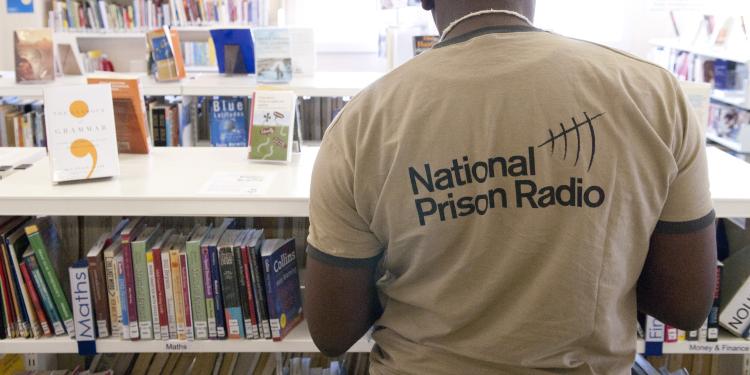
How Books Unlocked helps open doors for Britain's prison population
For the past decade, a scheme run by the National Literacy Trust in association with the Booker Prize Foundation has taken quality fiction - and authors - into almost 100 UK prisons, helping to democratise the enjoyment of reading and strengthen literacy skills
Alan Smith, Prison Library Coordinator for Staffordshire’s seven prisons, can still remember his first phone call with the National Literacy Trust, some 10 years ago. Would it be possible to get a group of young people in HMP/YOI Brinsford, near Wolverhampton, to meet in the library and read a Booker-shortlisted novel?
As Smith, one of the founders of the Books Unlocked scheme, recalls, ‘The book was Stephen Kelman’s Pigeon English and the reading group experience was life-changing for all involved. As we read and discussed the novel, social barriers were broken, a sense of connection and trust was established within the group and, by the final page, friendships had been formed and a better understanding of ourselves as individuals and readers had emerged.’
Kelman’s visit was the start of the Books Unlocked project. The idea was simple: people in custody should have access to quality literature, to support their development as readers and ensure they are part of a wider cultural conversation. That first event was a huge success, and Books Unlocked hasn’t looked back since.
We now promote reading in 95 prisons a year across the UK, Northern Ireland and the Republic of Ireland and have donated more than 15,000 books to prison reading groups. On a nightly basis, we broadcast serialised Booker titles into 80,000 cells via National Prison Radio. Listeners are encouraged to write to us and request a physical copy of the book, which is then sent directly to them.

Stephen Kelman. © Gary Doak / Alamy
Books Unlocked is now a literary movement working across the criminal justice sector, with the support of prison librarians, officers and reading champions throughout the prison estate.
Why is it so important? Because 60 per cent of the prison population has a problem with literacy. The majority have some reading skills but have never found their feet as readers. Books Unlocked brings fantastic books into the cells and lives of these individuals. It brings books alive with radio shows, reading groups and author visits. It democratises the enjoyment of reading. This, in turn, strengthens the literacy skills of people in prison, boosting employment opportunities and life chances on release.
Generous book donations from the publishing industry have expanded our reach, as have prison visits by brilliant Booker authors. Writers such as Sarah Waters, Salman Rushdie, Jim Crace, Elif Shafak and Max Porter have met reading groups and been interviewed on National Prison Radio. The National Literacy Trust’s Patron, Her Majesty The Queen Consort, is a great supporter of the programme and has visited reading groups in HMP Brixton and HMP Styal. She also took part in a memorable reading group discussion, broadcast on National Prison Radio.
They tell us that Books Unlocked has not only improved their literacy skills, but has also helped their wellbeing and given them opportunities to build friendships in what, for many, are painfully isolated circumstances. ‘Being part of Books Unlocked provides me with great escapism,’ one individual told us. ‘Meeting other like-minded people in the library to discuss books makes me feel that I’m not in prison.’

Sarah Waters.
© Gary Doak / AlamyDuring the pandemic, when people in prison were spending up to 23 hours a day in their cells and prison cultural and education services stopped, Books Unlocked continued. Our team posted books from their homes directly to prisons, continued to broadcast directly into cells and maintained a steady stream of activities, which were a literacy lifeline for many.
Each year we evaluate the programme, asking those in custody what it has done for them. Over 10 years, we have heard powerful and consistent stories telling us about the value of becoming a reader in prison. One individual told us: ‘When I get released, I’m going to go to the library, which I’ve never done before.’
We are incredibly grateful to the Booker Prize Foundation for its generous and enthusiastic support of this vital programme, as well as to prison librarians, without whom Books Unlocked couldn’t operate. They often tell us just how big an impact the scheme has had on people in prison.
‘The most valuable thing about Books Unlocked is being able to say, “No you don’t have to bring it back, that’s your book,”’ one librarian told us. ‘Many of them come back and talk to us about the book or will tell us that they have passed it to another individual, along with a recommendation to read it.’
Jonathan Douglas is Chief Executive of the National Literacy Trust

The then Duchess of Cornwall joins a Books Unlocked reading group organised by The National Literary Trust at HMP Brixton in London where people in prison were discussing the Man Booker Prize-shortlisted book Pigeon English with author Stephen Kelman, 2014
© Booker Prize Foundation